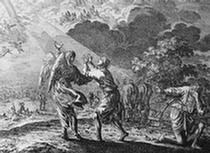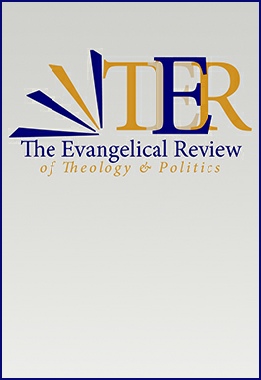THE EVANGELICAL REVIEW OF THEOLOGY & POLITICS
VOL. 3, 2015
ARTICLES
Article
Shannon Holzer, ‘The Principle of Civil Strife and the Exclusion of Religious Reasoning from the Public Square.’
KEY WORDS
|| Philosophy || Philosophy of Religion || Philosophy of Law || Religion and Politics ||
|| Religion and Politics || Religious Epistemology || Legal Philosophy ||
|| Religious Persecution || Ethics ||
ABSTRACT
 It has been argued that citizens should use restraint in using certain types of reasoning while operating in the public square. Specifically, religious reasoning has been singled out as one that should not be used for the creation of legislation. Though there are a multitude of reasons for this, one rationale that is often cited is the claim that religion is divisive and dangerous. This assumption has become engrained in the legal community, and it has for the most part gone unchallenged. This article argues that religious reasoning is not always divisive and dangerous. It often promotes peace and unity. Moreover, secular reasoning does not always lead to peace, and it has in fact lead to some of the most heinous violations of human rights in history. Furthermore, to use the avoidance of potential division and civil strife to exclude certain types of public reason as a guiding principle is too broad. The principle, if applied universally, would exclude not only religious reasons, but it would also exclude historical, scientific, and legal reasoning. Thus, it would be wise to allow religious reasoning just as the other sources of justification are allowed until certain claims show themselves to be false or in violation of others’ rights. This is asking for no more than what other sources of justification are afforded.
It has been argued that citizens should use restraint in using certain types of reasoning while operating in the public square. Specifically, religious reasoning has been singled out as one that should not be used for the creation of legislation. Though there are a multitude of reasons for this, one rationale that is often cited is the claim that religion is divisive and dangerous. This assumption has become engrained in the legal community, and it has for the most part gone unchallenged. This article argues that religious reasoning is not always divisive and dangerous. It often promotes peace and unity. Moreover, secular reasoning does not always lead to peace, and it has in fact lead to some of the most heinous violations of human rights in history. Furthermore, to use the avoidance of potential division and civil strife to exclude certain types of public reason as a guiding principle is too broad. The principle, if applied universally, would exclude not only religious reasons, but it would also exclude historical, scientific, and legal reasoning. Thus, it would be wise to allow religious reasoning just as the other sources of justification are allowed until certain claims show themselves to be false or in violation of others’ rights. This is asking for no more than what other sources of justification are afforded.
Uploaded/Published : January 19, 2015 | ERTP Vol 3, 2015, pages, A1-10
Article
Daniel Kayley, ‘The Case for Post-Tribulationism’
KEY WORDS
|| Day of the Lord || Imminency || Rapture || Second Coming ||
|| Olivet Discourse || Great Tribulation ||
ABSTRACT
 This article surveys the merits for post-tribulationism in contrast to pre-tribulationism or the pre-wrath view, advocating post-tribulationism as the most compelling. It explores several of the principal questions around which the debate has centred, many of which revolve around the exegetical viability of separating the rapture from the Parousia by a period of divine wrath. Post-tribulational advocates are not convinced that there exists a gap of time between these two events, characterized by divine wrath. There are theological tensions in both camps, however it is the position of this article that as the various biblical passages that relate to the rapture are viewed through the lens of post-tribulationism that these theological tensions are reasonably resolved.
This article surveys the merits for post-tribulationism in contrast to pre-tribulationism or the pre-wrath view, advocating post-tribulationism as the most compelling. It explores several of the principal questions around which the debate has centred, many of which revolve around the exegetical viability of separating the rapture from the Parousia by a period of divine wrath. Post-tribulational advocates are not convinced that there exists a gap of time between these two events, characterized by divine wrath. There are theological tensions in both camps, however it is the position of this article that as the various biblical passages that relate to the rapture are viewed through the lens of post-tribulationism that these theological tensions are reasonably resolved.
Uploaded/Published : April 18, 2015 | ERTP Vol 3, 2015, pages, A11-28
Article
Joseph Koech, ‘Interpreting the New Testament in the East African Context’
KEY WORDS
|| Biblical Interpretation || Grammatico-Historical || Inculturation Hermeneutics ||
|| African Context || Exegesis || Worldview || Culture ||
ABSTRACT
 Historically biblical interpretation in East Africa is the brainchild of the Western world. Missionaries brought the gospel to this region but influenced by their western cultural perspectives. The first African biblical scholars in East Africa attended seminaries in the West where they received training in the western approaches to biblical understanding and interpretation. Such methodologies could not fit the needs of African situation. Africans seek Bible reading informed by their cultural perspectives, worldview and life experience. Presently there exist diverse approaches to biblical interpretation propounded by African scholars. Their concern has been how to make the message not only understood by Africans but also relevant to them. This paper attempts to show the significance and challenges of grammatico-historical method of interpretation for African contexts. It also examines the existence of diverse biblical interpretations within the African context. The African context has its peculiar issues such as culture, worldview, political, social and economic concerns among others. This impact on the responses to the interpretation of the scripture that should ensure relevance to the particular context. Such an approach should seek to empower the African readers and hearers for a critical study of the Bible in relation to their life-situations, and for personal and societal transformation.
Historically biblical interpretation in East Africa is the brainchild of the Western world. Missionaries brought the gospel to this region but influenced by their western cultural perspectives. The first African biblical scholars in East Africa attended seminaries in the West where they received training in the western approaches to biblical understanding and interpretation. Such methodologies could not fit the needs of African situation. Africans seek Bible reading informed by their cultural perspectives, worldview and life experience. Presently there exist diverse approaches to biblical interpretation propounded by African scholars. Their concern has been how to make the message not only understood by Africans but also relevant to them. This paper attempts to show the significance and challenges of grammatico-historical method of interpretation for African contexts. It also examines the existence of diverse biblical interpretations within the African context. The African context has its peculiar issues such as culture, worldview, political, social and economic concerns among others. This impact on the responses to the interpretation of the scripture that should ensure relevance to the particular context. Such an approach should seek to empower the African readers and hearers for a critical study of the Bible in relation to their life-situations, and for personal and societal transformation.
Uploaded/Published : July 21, 2015 | ERTP Vol 3, 2015, pages, A29-42
Article
Salvador Ung Hayworth, ‘Jesus’ Relationship to Israel as Evidenced in the Matthean Infancy Narratives’
KEY WORDS
|| Christology || Israel || Matthean Theology ||
|| Use of OT in the NT || Prophetic Fulfilment || Supersessionism ||
ABSTRACT
 Various scholars have proposed that Mattthean Christology portrays Jesus as the 'true Israel' or 'new Israel'. This designation leaves one to wonder whether this involves an abrogation of Israel in an ethnic sense. In other words, does Matthew present the reader with a supersessionist Christology? Though this paper will not answer this question, it does seek to explore a major aspect of it. This paper seeks to explore Jesus' relationship to Israel in the Matthean infancy narratives. From Matt. 1:18 - 2:23 the narratives serve to illustrate Jesus' fulfilment of five OT citations. Matt. 1:18-25 concerns the fulfilment of Isa. 7:14. Matt. 2:1-12 concerns Mic. 5:2. Matt. 2:13-15 concerns Hos. 11:1 and allusions to Exodus. Matt. 2:16-18 concerns Jer. 31:15 with possible allusions to the Exodus. Matt. 2:19-23 concerns the fulfilment of some unstated OT reference(s). Matthean Christology, at least of the infancy narratives, concerns Jesus' fulfilment of OT scripture. This paper will analyse each narrative individually, examining both the context of the OT citation and that of the Matthean narrative surrounding the citation. This paper will then piece together the findings into a coherent statement regarding Jesus' relationship to Israel.
Various scholars have proposed that Mattthean Christology portrays Jesus as the 'true Israel' or 'new Israel'. This designation leaves one to wonder whether this involves an abrogation of Israel in an ethnic sense. In other words, does Matthew present the reader with a supersessionist Christology? Though this paper will not answer this question, it does seek to explore a major aspect of it. This paper seeks to explore Jesus' relationship to Israel in the Matthean infancy narratives. From Matt. 1:18 - 2:23 the narratives serve to illustrate Jesus' fulfilment of five OT citations. Matt. 1:18-25 concerns the fulfilment of Isa. 7:14. Matt. 2:1-12 concerns Mic. 5:2. Matt. 2:13-15 concerns Hos. 11:1 and allusions to Exodus. Matt. 2:16-18 concerns Jer. 31:15 with possible allusions to the Exodus. Matt. 2:19-23 concerns the fulfilment of some unstated OT reference(s). Matthean Christology, at least of the infancy narratives, concerns Jesus' fulfilment of OT scripture. This paper will analyse each narrative individually, examining both the context of the OT citation and that of the Matthean narrative surrounding the citation. This paper will then piece together the findings into a coherent statement regarding Jesus' relationship to Israel.
Uploaded/Published : October 21, 2015 | ERTP Vol 3, 2015, pages, A43-60
Article
Daniel Martin, ‘Mark’s Use of Isaiah’
KEY WORDS
|| Mark || Isaiah || Servant of the Lord ||
|| New Testament use of Old Testament || Hermeneutics || Markan Christology ||
ABSTRACT
 Mark’s gospel makes plentiful cryptic references and allusions to the Old Testament whilst being sparing with explicit quotations. Texts from Isaiah are frequently alluded to. This study examines Mark’s use of these texts in order to ascertain the essential theological burden that is drawn from Isaiah. It is apparent that Mark has drawn on three core themes and developed them in his Gospel. Firstly, that the ‘way’ of the Lord coming to save is the way of Jesus to the cross. Secondly, that Jesus characterises the divinely-appointed, Spirit-filled servant of Yahweh. Thirdly, that Jesus characterises the enigmatic suffering servant of Yahweh.
Mark’s gospel makes plentiful cryptic references and allusions to the Old Testament whilst being sparing with explicit quotations. Texts from Isaiah are frequently alluded to. This study examines Mark’s use of these texts in order to ascertain the essential theological burden that is drawn from Isaiah. It is apparent that Mark has drawn on three core themes and developed them in his Gospel. Firstly, that the ‘way’ of the Lord coming to save is the way of Jesus to the cross. Secondly, that Jesus characterises the divinely-appointed, Spirit-filled servant of Yahweh. Thirdly, that Jesus characterises the enigmatic suffering servant of Yahweh.
Uploaded/Published : December 8, 2015 | ERTP Vol 3, 2015, pages, A61-78
REVIEW ARTICLES
Review Article
Evangelical Orthodoxy: A Trinitarian Revival?
Lincoln Harvey (ed.), The Theology of Colin Gunton (London & New York, Continuum, T&T Clark, 2010).
David A. Höhne, Spirit and Sonship. Colin Gunton's Theology of Particularity and the Holy Spirit (Series: New Critical Thinking in Religion, Theology and Biblical Studies, Farnham, UK, Ashgate, 2010).
Bradley G. Green, Colin Gunton and the Failure of Augustine: The Theology of Colin Gunton in the Light of Augustine (Eugene, OR, Wipf & Stock, Pickwick Publications 2011).
KEY WORDS
|| Doctrine of God || Trinity || Evangelical || Reformed || Creed || Systematic Theology ||
Reviewed by P.H. Brazier
Uploaded/Published : January 9, 2015 | ERTP Vol 3, 2015, pages, RA1-6.
Review Article
Apocalyptic Belief and Evangelical Interpretations of the Northern Irish Troubles:
is Ulster Fixated on the End-Times?
J.T. Searle, The Scarlet Woman and the Red Hand: Evangelical Apocalyptic Belief in the Northern Irish Troubles (Eugene, OR, Wipf & Stock, Pickwick Publications 2014).Uploaded/Published : February 4, 2015.
KEY WORDS
|| Apocalyptic || Eschatology || Northern Irish Politics || Prophecy || Moral Conservatism ||
Reviewed by Stephen Kneale
Uploaded/Published : February 4, 2015 | ERTP Vol 3, 2015, pages, RA7-14.
Review Article
Karl Barth: Supersessionism and Israel, Yeshua and God's Election – a Dialectical Balance?
Katherine Sonderegger, That Jesus was Born a Jew: Karl Barth’s Doctrine of Israel, (Pennsylvania State University Press, 1992).
R. Kendall Soulen, ‘Consummation at the End of Christendom,’ in The God of Israel and Christian Theology (Minneapolis, MN: Augsburg Fortress, 1996).
Mark R. Lindsay, Barth, Israel and Jesus (Barth Studies Series; Aldershot UK / Burlington VT, USA, Ashgate Publishing, 2007).
Mark R., Lindsay, Reading Auschwitz with Barth: The Holocaust as Problem and Promise for Barthian Theology (Princeton Theological Monograph; Eugene, OR: Wipf & Stock, Pickwick Publications, 2014).
Mark S. Gignilliat, Karl Barth and the Fifth Gospel: Barth's Theological Exegesis of Isaiah, (Barth Studies Series; Aldershot UK / Burlington VT, USA, Ashgate Publishing, 2009).
Carys Moseley, Nations and Nationalism in the Theology of Karl Barth (Oxford: OUP, 2013).
KEY WORDS
|| Yeshua-Jesus-Messiah || The Universal Christ || Salvation-Redemption ||
|| Supersessionism-Election || The Bible || Karl Barth || Israel-Israelitisch ||
|| Nations-Nationalism || Dialectic-Antinomy ||
Reviewed by P.H. Brazier
Uploaded/Published : September 21, 2015 | ERTP Vol 3, 2015, pages, RA15-34.
CONFERENCE PAPERS
‘Christianity & Culture’
Evangelical Theology in Post-Christian Britain
25-26 September 2015
Equipping the Church; Engaging the Culture
Details of the Conference
Full contents/details of the conference papers –
authors, abstracts, keywords, etc.
BOOK REVIEWS
Review
Russell D. Moore, The Kingdom of Christ: The New Evangelical Perspective. Wheaton, IL: Crossway. 2004.
Reviewed by Gregory Hagg.
Uploaded/Published : June 9, 2015 | ERTP Vol 3, 2015, pages, BR1-6
Review
David Zadok, Sandra Teplinsky, and Judith Rood, Three Papers from The Borough Park Symposium 4, New York, February 2014.
Reviewed by Robert Walter.
Uploaded/Published : June 7, 2015 | ERTP Vol 3, 2015, pages, BR7-10
Review
Stephen Spector, Evangelicals and Israel: The Story of American Christian Zionism. Oxford, UK: Oxford University Press, Inc. 2009.
Reviewed by Richard Flashman.
Uploaded/Published : June 8, 2015 | ERTP Vol 3, 2015, pages, BR11-16
Review
Darrell L. Bock, and Mitch Glaser, The People, the Land, and the Future of Israel: Israel and the Jewish People in the Plan of God, Grand Rapids, MI: Kregel Publications, 2014.
Reviewed by Slava Ilchishin.
Uploaded/Published : June 8, 2015 | ERTP Vol 3, 2015, pages, BR17-20
Review
Johnson T.K. Lim, Holy Spirit: Unfinished Agenda, Singapore: WordnWorks, 2015.
Reviewed by Timothy T. N. Lim.
Uploaded/Published : July 16, 2015 | ERTP Vol 3, 2015, pages, BR21-24
Review
Alexander Chow, Theosis, Sino-Christian Theology and the Second Chinese Enlightenment: Heaven and Humanity in Unity, Series: Christianities of the World. New York, US: Palgrave Macmillan, 2013.
Reviewed by Edwin Tay.
Uploaded/Published : July 16, 2015 | ERTP Vol 3, 2015, pages, BR25-26
Review
Mark Lewis Taylor, The Theological and the Political: On the Weight of the World, Minneapolis, MN: Fortress Press, 2011.
Reviewed by Henry Kuo.
Uploaded/Published : September 14, 2015 | ERTP Vol 3, 2015, pages, BR27-30
Review
Jacob Fronczak, Israel Matters: Putting the Jewish People Back at the Centre of God’s Plan, Marshfield, MO: First Fruits of Zion, 2015.
Reviewed by Brian Brewer.
Uploaded/Published : December 15, 2015 | ERTP Vol 3, 2015, pages, BR31-32








 It has been argued that citizens should use restraint in using certain types of reasoning while operating in the public square. Specifically, religious reasoning has been singled out as one that should not be used for the creation of legislation. Though there are a multitude of reasons for this, one rationale that is often cited is the claim that religion is divisive and dangerous. This assumption has become engrained in the legal community, and it has for the most part gone unchallenged. This article argues that religious reasoning is not always divisive and dangerous. It often promotes peace and unity. Moreover, secular reasoning does not always lead to peace, and it has in fact lead to some of the most heinous violations of human rights in history. Furthermore, to use the avoidance of potential division and civil strife to exclude certain types of public reason as a guiding principle is too broad. The principle, if applied universally, would exclude not only religious reasons, but it would also exclude historical, scientific, and legal reasoning. Thus, it would be wise to allow religious reasoning just as the other sources of justification are allowed until certain claims show themselves to be false or in violation of others’ rights. This is asking for no more than what other sources of justification are afforded.
It has been argued that citizens should use restraint in using certain types of reasoning while operating in the public square. Specifically, religious reasoning has been singled out as one that should not be used for the creation of legislation. Though there are a multitude of reasons for this, one rationale that is often cited is the claim that religion is divisive and dangerous. This assumption has become engrained in the legal community, and it has for the most part gone unchallenged. This article argues that religious reasoning is not always divisive and dangerous. It often promotes peace and unity. Moreover, secular reasoning does not always lead to peace, and it has in fact lead to some of the most heinous violations of human rights in history. Furthermore, to use the avoidance of potential division and civil strife to exclude certain types of public reason as a guiding principle is too broad. The principle, if applied universally, would exclude not only religious reasons, but it would also exclude historical, scientific, and legal reasoning. Thus, it would be wise to allow religious reasoning just as the other sources of justification are allowed until certain claims show themselves to be false or in violation of others’ rights. This is asking for no more than what other sources of justification are afforded. This article surveys the merits for post-tribulationism in contrast to pre-tribulationism or the pre-wrath view, advocating post-tribulationism as the most compelling. It explores several of the principal questions around which the debate has centred, many of which revolve around the exegetical viability of separating the rapture from the Parousia by a period of divine wrath. Post-tribulational advocates are not convinced that there exists a gap of time between these two events, characterized by divine wrath. There are theological tensions in both camps, however it is the position of this article that as the various biblical passages that relate to the rapture are viewed through the lens of post-tribulationism that these theological tensions are reasonably resolved.
This article surveys the merits for post-tribulationism in contrast to pre-tribulationism or the pre-wrath view, advocating post-tribulationism as the most compelling. It explores several of the principal questions around which the debate has centred, many of which revolve around the exegetical viability of separating the rapture from the Parousia by a period of divine wrath. Post-tribulational advocates are not convinced that there exists a gap of time between these two events, characterized by divine wrath. There are theological tensions in both camps, however it is the position of this article that as the various biblical passages that relate to the rapture are viewed through the lens of post-tribulationism that these theological tensions are reasonably resolved. Historically biblical interpretation in East Africa is the brainchild of the Western world. Missionaries brought the gospel to this region but influenced by their western cultural perspectives. The first African biblical scholars in East Africa attended seminaries in the West where they received training in the western approaches to biblical understanding and interpretation. Such methodologies could not fit the needs of African situation. Africans seek Bible reading informed by their cultural perspectives, worldview and life experience. Presently there exist diverse approaches to biblical interpretation propounded by African scholars. Their concern has been how to make the message not only understood by Africans but also relevant to them. This paper attempts to show the significance and challenges of grammatico-historical method of interpretation for African contexts. It also examines the existence of diverse biblical interpretations within the African context. The African context has its peculiar issues such as culture, worldview, political, social and economic concerns among others. This impact on the responses to the interpretation of the scripture that should ensure relevance to the particular context. Such an approach should seek to empower the African readers and hearers for a critical study of the Bible in relation to their life-situations, and for personal and societal transformation.
Historically biblical interpretation in East Africa is the brainchild of the Western world. Missionaries brought the gospel to this region but influenced by their western cultural perspectives. The first African biblical scholars in East Africa attended seminaries in the West where they received training in the western approaches to biblical understanding and interpretation. Such methodologies could not fit the needs of African situation. Africans seek Bible reading informed by their cultural perspectives, worldview and life experience. Presently there exist diverse approaches to biblical interpretation propounded by African scholars. Their concern has been how to make the message not only understood by Africans but also relevant to them. This paper attempts to show the significance and challenges of grammatico-historical method of interpretation for African contexts. It also examines the existence of diverse biblical interpretations within the African context. The African context has its peculiar issues such as culture, worldview, political, social and economic concerns among others. This impact on the responses to the interpretation of the scripture that should ensure relevance to the particular context. Such an approach should seek to empower the African readers and hearers for a critical study of the Bible in relation to their life-situations, and for personal and societal transformation. Various scholars have proposed that Mattthean Christology portrays Jesus as the 'true Israel' or 'new Israel'. This designation leaves one to wonder whether this involves an abrogation of Israel in an ethnic sense. In other words, does Matthew present the reader with a supersessionist Christology? Though this paper will not answer this question, it does seek to explore a major aspect of it. This paper seeks to explore Jesus' relationship to Israel in the Matthean infancy narratives. From Matt. 1:18 - 2:23 the narratives serve to illustrate Jesus' fulfilment of five OT citations. Matt. 1:18-25 concerns the fulfilment of Isa. 7:14. Matt. 2:1-12 concerns Mic. 5:2. Matt. 2:13-15 concerns Hos. 11:1 and allusions to Exodus. Matt. 2:16-18 concerns Jer. 31:15 with possible allusions to the Exodus. Matt. 2:19-23 concerns the fulfilment of some unstated OT reference(s). Matthean Christology, at least of the infancy narratives, concerns Jesus' fulfilment of OT scripture. This paper will analyse each narrative individually, examining both the context of the OT citation and that of the Matthean narrative surrounding the citation. This paper will then piece together the findings into a coherent statement regarding Jesus' relationship to Israel.
Various scholars have proposed that Mattthean Christology portrays Jesus as the 'true Israel' or 'new Israel'. This designation leaves one to wonder whether this involves an abrogation of Israel in an ethnic sense. In other words, does Matthew present the reader with a supersessionist Christology? Though this paper will not answer this question, it does seek to explore a major aspect of it. This paper seeks to explore Jesus' relationship to Israel in the Matthean infancy narratives. From Matt. 1:18 - 2:23 the narratives serve to illustrate Jesus' fulfilment of five OT citations. Matt. 1:18-25 concerns the fulfilment of Isa. 7:14. Matt. 2:1-12 concerns Mic. 5:2. Matt. 2:13-15 concerns Hos. 11:1 and allusions to Exodus. Matt. 2:16-18 concerns Jer. 31:15 with possible allusions to the Exodus. Matt. 2:19-23 concerns the fulfilment of some unstated OT reference(s). Matthean Christology, at least of the infancy narratives, concerns Jesus' fulfilment of OT scripture. This paper will analyse each narrative individually, examining both the context of the OT citation and that of the Matthean narrative surrounding the citation. This paper will then piece together the findings into a coherent statement regarding Jesus' relationship to Israel. Mark’s gospel makes plentiful cryptic references and allusions to the Old Testament whilst being sparing with explicit quotations. Texts from Isaiah are frequently alluded to. This study examines Mark’s use of these texts in order to ascertain the essential theological burden that is drawn from Isaiah. It is apparent that Mark has drawn on three core themes and developed them in his Gospel. Firstly, that the ‘way’ of the Lord coming to save is the way of Jesus to the cross. Secondly, that Jesus characterises the divinely-appointed, Spirit-filled servant of Yahweh. Thirdly, that Jesus characterises the enigmatic suffering servant of Yahweh.
Mark’s gospel makes plentiful cryptic references and allusions to the Old Testament whilst being sparing with explicit quotations. Texts from Isaiah are frequently alluded to. This study examines Mark’s use of these texts in order to ascertain the essential theological burden that is drawn from Isaiah. It is apparent that Mark has drawn on three core themes and developed them in his Gospel. Firstly, that the ‘way’ of the Lord coming to save is the way of Jesus to the cross. Secondly, that Jesus characterises the divinely-appointed, Spirit-filled servant of Yahweh. Thirdly, that Jesus characterises the enigmatic suffering servant of Yahweh.